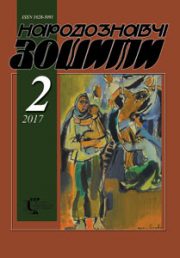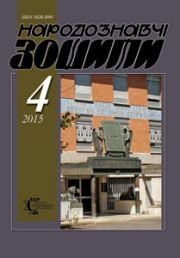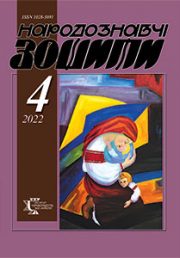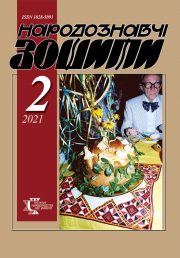The Ethnology Notebooks. 2023. № 4 (172), 904—916
UDK: 930.2:[328.1(410:477-054.73):355.01(470+571:477)”202″]
DOI https://doi.org/10.15407/nz2023.04.904
BARAN Zoya
- ORСID ID: https://orcid.org/0000-0001-9685-3953
- Candidate of History, Associate Professor,
- Ivan Franko National University of Lviv,
- Department of Modern and Contemporary History of Foreign Countries,
- 1, Universytetska str., 79000, Lviv, Ukraine,
- Contacts: е-mail: zoja_baran@ukr.net
Abstract. Introduction. More than 4 million Ukrainians were forced to leave their homes and go abroad during the first five weeks after the outbreak of the full-scale Russian-Ukrainian war. The United Kingdom, like other democracies around the world, is facing the challenge of providing shelter to victims of unprovoked aggression.
Problem Statement. Parliamentary debates in the UK on the issue of providing assistance to Ukrainian refugees began in the first days of the war. The position of government circles and politicians was unequivocal in condemning the actions of the Kremlin authorities and providing the widest possible assistance to Ukraine.
The purpose of the article is to retrace the evolution of the UK government’s response to the issue of Ukrainian refugees since the beginning of the full-scale Russian-Ukrainian war on February 24, 2022, and the launch of the discussion by British politicians, until the government’s program of legal entry mechanisms was put into effect and its first results (early April 2022).
The source base of the research included international acts; laws, speeches and statements of high-ranking UK officials, transcripts of parliamentary debates; and statistical data.
Results. The UK political community has shown unanimity in providing assistance to Ukrainian refugees. A similar position was taken by the country’s population, which actively responded to an electronic petition for a visa-free regime for Ukrainians. However, the government, based on the security of its own people, adopted a special program for Ukrainian refugees, which provided two legal mechanisms for their entry into the UK: from March 1, 2022, under the Family Reunification program (some of the usual criteria for family members, such as language proficiency and salary thresholds, were waived) and from March 18, under the Homes for Ukraine program based on humanitarian sponsorship (individuals, charities, businesses and community groups). The governments of Scotland and the Wales acted as sponsors themselves. These decisions gave Ukrainians the opportunity to live, work, and study in the UK for three years.
My key research conclusions are based on the thesis that the UK government and people have expressed their unwavering support for Ukraine during the most difficult period — the first weeks of the full-scale Russian-Ukrainian war. According to statistics, the percentage of visas issued in relation to the country’s population is insignificant, but the growth dynamics is obvious. According to the UN, as of May 9, 2023, there were 204, 700 refugees from Ukraine in the UK.
Keywords: Ukraine, Great Britain, Russian-Ukrainian war, refugees.
Received 21.06.2023
REFERENCES
- British Red Cross. Retrieved from:https://www.redcross.org.uk/get-help/get-help-as-a-refugee/help-for-refugees-from-ukraine (Last accessed: 29.04.2023).
- Gov. UK. Retrieved from: https://www.gov.uk/government/publications/ukraine-family-scheme-application-data/ukraine-family-scheme-and-ukraine-sponsorship-scheme-homes-for-ukraine-visa-data–2 (Last accessed: 26.05.2023).
- Hansard. House of Commons. Ukraine (Vol. 70): debated on Thursday 24 February 2022. Retrieved from: https://hansard.parliament.uk/commons/2022-02-24/debates/A76282B2-C1F4-4D00-B5E8-A8A0F2476FBB/Ukraine (Last accessed: 17.01.2023).
- Hansard. House of Commons. Ukraine (Vol. 709): debated on Friday 25 February 2022. Retrieved from: https://hansard.parliament.uk/commons/2022-02-25/debates/A1EE729F-F80E-452A-BA2C-49178A52766E/Ukraine (Last accessed: 17.01.2023).
- Hansard. House of Commons. Sanctions (Vol. 709): debated on Monday 28 February 2022. Retrieved from: https://hansard.parliament.uk/commons/2022-02-28/debates/3D28CB2C-B2E4-40B4-B40A-6D0D1147B6C9/Sanctions (Last accessed: 17.01.2023).
- Hansard. House of Commons. Ukraine (Vol. 709): debated on Tuesday 1 March 2022. Retrieved from: https://hansard.parliament.uk/commons/2022-03-01/debates/2BD3EE0E-5EF0-42E0-B9BE-3AA0D03BEF86/Ukraine (Last accessed: 17.01.2023).
- Hansard. House of Commons. Support for Ukraine and Countering Threats from Russia (Vol. 709): debated on Wednesday 2 March 2022. Retrieved from: https://hansard.parliament.uk/commons/2022-03-02/debates/534F1DF9-9D78-46AE-840E-6DABEF47238E/SupportForUkraineAndCounteringThreats From Russia (Last accessed: 18.01.2023).
- Hansard. House of Commons. Ukrainian refugees (Vol. 710): debated on Monday 14 March 2022. Retrieved from: https://hansard.parliament.uk/Commons/2022-03-14/debates/7F61EFBF-4EDF-43C3-A739-AA1FFA3F63CE/ UkrainianRefugees (Last accessed: 20.04.2023).
- Hansard. House of Lords. Ukraine (Vol. 819): debated on Thursday 24 February 2022. Retrieved from: https://hansard.parliament.uk/lords/2022-02-24/debates/B6D3CFD9-A479-4B8D-95CA-0942F0C477A0/Ukraine (Last accessed: 18.01.2023).
- Hansard. House of Lords. Ukraine: NATO Membership (Vol. 819): debated on Thursday 24 February 2022. Retrieved from: https://hansard.parliament.uk/lords/2022-02-24/debates/C842B116-1C10-4828-913C-4996653696EA/UkraineNATO Membership (Last accessed: 18.01.2023).
- Hansard. House of Lords. Ukraine (Vol. 819): debated on Friday 25 February 2022. Retrieved from: https://hansard.parliament.uk/lords/2022-02-25/debates/57D18764-DD46-4BF1-BA08-E53C9CDF3774/Ukraine (Last accessed: 18.01.2023).
- Hansard. House of Lords. Ukraine: Visa Restrictions for Refugees (Vol. 819): debated on Monday 28 February 2022. Retrieved from: https://hansard.parliament.uk/lords/2022-02-28/debates/DA94BD01-8346-42A4-9605-3ED33760E48D/UkraineVisa RestrictionsForRefugees (Last accessed: 18.01.2023).
- Hansard. House of Lords. Sanctions (Vol. 819): debated on Tuesday 1 March 2022. Retrieved from: https://hansard.parliament.uk/lords/2022-03-01/debates/54FD4A85-5C07-44F3-AEC4-93E662D64B1C/Sanctions (Last accessed: 18.01.2023).
- Hansard. House of Lords. Ukraine (Vol. 819): debated on Wednesday 2 March 2022. Retrieved from: https://hansard.parliament.uk/lords/2022-03-02/debates/8C84A8B1-EFBF-4783-892F-2FF1FD217B3F/Ukraine (Last accessed: 20.01.2023).
- Hansard. House of Lords. Ukrainian refugees (Vol. 820): debated on Tuesday 15 March 2022. Retrieved from: https://hansard.parliament.uk/Lords/2022-03-15/debates/EE98943E-97A0-4828-BD61-B4B894B3EB1C/UkrainianRefugees (Last accessed: 20.04.2023).
- Hansard. House of Lords. Ukraine: refugees (Vol. 820): debated on Wednesday 6 April 2022. Retrieved from: https://hansard.parliament.uk/lords/2022-04-06/debates/8D81AC06-3AA2-47E2-B145-98F1B87CA4D7/UkraineRefugees (Last accessed: 20.04.2023).
- Help Uraine Scotland. Retrieved from: https://helpukrainescotland.com/visas-and-immigration (Last accessed: 29.04.2023) [in Ukrainian].
- Institute for government. Ukraine crisis: UK support for refugees from Ukraine. Retrieved from: https://www.instituteforgovernment.org.uk/article/explainer/ukraine-crisis-uk-support-refugees-ukraine (Last accessed: 29.04.2023).
- Konventsiia pro status bizhentsiv. Retrieved from: https://zakon.rada.gov.ua/laws/show/ 995_011#Text (Last accessed: 28.04.2023) [in Ukrainian].
- Kozerod, Oleh. (2010). British conservative politician Stefan Terletsky
- (1927—2006). Ukrainskyj istorycznyj zurnal, 5, 202—207 [in Ukrainian].
- Kozytskyi, Andrii. (2012). Genocide and the policy of mass extermination of the civilian population in the 20th century. (causes, features, consequences). Lviv: Litopys [in Ukrainian].
- Nationality and Borders Act 2022. Retrieved from: https://www.legislation.gov.uk/ukpga/ 2022/36/contents/enacted (Last accessed: 23.04.2023).
- National statistics. Statistics on Ukrainians in UK. Retrieved from: https://www.gov.uk/government/statistics/immigration-statistics-year-ending-june-2022/statistics-on-ukrainians-in-the-uk (Last accessed: 26.05.2023).
- Offer fast track asylum to any Ukrainians displaced due to the invasion. Retrieved from:https://petition.parliament.uk/petitions/609382; https://petition.parliament.uk/ petitions/609382.json (Last accessed: 19.05.2023).
- Koliushko, I., Kirmach, A., & Burnet, K. (2007). Opposition is good for you. Great Britain‘s experience and proposals for Ukraine: Kyiv (Last accessed: 17.01.2023) [in Ukrainian].
- Population estimates for the UK, England, Wales, Scotland and Northern Ireland: mid-2021. Released on: 25 June 2021. Statistical bulletin. Retrieved from: ///C:/Users/Asus/Downloads/Population%20estimates%20for%20the%20UK,%20England,%20Wales,%20Scotland%20and%20Northern%20Ireland%20mid-2021.pdf (Last accessed: 26.05.2023).
- Tykhenko, Volodymyr. (2021). Ukrainian Stefan Terletskyi (1927—2006) is a well-known British politician and public figure (according to Tsdaz documents) Arkhivy Ukrainy, 326 (Issue 1, pp. 226—237). Kyiv [in Ukrainian].
- Ukraine refugee situation. Retrieved from: https://data2.unhcr.org/en/situations/ukraine (Last accessed: 26.05.2023).
- UKRAINE SITUATION FLASH UPDATE #47 19 May 2023. United Nations High Commissioner for Refugees. Retrieved from: file:///C:/Users/Asus/Downloads /2023%2005%2019%20Ukraine%20situation%20flash%20update%20No%2047.pdf (Last accessed: 25.05.2023).
- United Nations. International Tribunal for the Prosecution of Persons Responsible for Serious Violations of International Humanitarian Law Committed in the Territory of the Former Yugoslavia since 1991. Retrieved from: https://www.icty.org/x/cases/ blaskic/acjug/en/bla-aj040729e.pdf (Last accessed: 17.01.2023).
- Office of the United Nations High Commissioner for Refugees.Retrieved from: https://www.unhcr.org/ua/refugees-asylum-seekers_ua (Last accessed: 28.04.2023).
- Waive visa requirement for Ukrainian refugees. Retrieved from: https://petition.parliament.uk/petitions/609530 (Last accessed: 19.05.2023).







